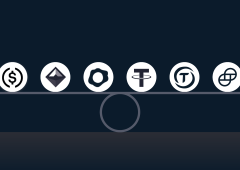US House Fails to Overturn SEC Crypto Custody Guidance
13.07.2024 11:30 2 min. read Alexander Stefanov Source: https://cryptopotato.com/house-fails-to-overturn-bidens-veto-on-crypto-custody-guidance-sec-offers-new-path/
Source: https://cryptopotato.com/house-fails-to-overturn-bidens-veto-on-crypto-custody-guidance-sec-offers-new-path/
The US House of Representatives recently attempted to overturn President Biden's veto of a measure aimed at nullifying SEC guidance known as SAB 121.
This guidance mandates that banks and other financial institutions treat cryptocurrencies held on behalf of clients as liabilities on their balance sheets. This requirement has been contentious within the financial sector, as it complicates the offering of crypto custody services by large institutions.
Despite passing a bipartisan Congressional Review Act (CRA) resolution in both the House and Senate to nullify SAB 121, President Biden vetoed the measure back in May. The House vote to overturn the veto fell short of the required two-thirds majority, resulting in a 228-184 outcome on July 11.
Supporters of nullifying SAB 121 argue that the guidance diverges significantly from traditional accounting practices for custodial assets and poses challenges to providing secure custody of digital assets.
They contend that these requirements undermine the industry’s ability to innovate and provide safe custody solutions to customers.
Meanwhile, the SEC has shown some flexibility by offering pathways for banks and brokerages to manage crypto holdings without necessarily listing them as liabilities.
This approach marks a departure from the strict enforcement of SAB 121 and aims to balance regulatory oversight with the need for financial institutions to innovate in the digital asset space. Despite these developments, SAB 121 remains in effect following the failed attempt to override President Biden’s veto, continuing to influence how financial institutions handle crypto custody.
-
1
US and UK Unite on New Capital Markets and Crypto Initiative
22.09.2025 19:00 2 min. read -
2
Michigan Lawmakers Revive Bill to Create State Crypto Reserve
19.09.2025 17:43 2 min. read -
3
SEC Greenlights State Trust Companies as Qualified Custodians for Crypto
01.10.2025 10:00 3 min. read -
4
Turkey Plans Law Allowing Watchdog to Freeze Crypto Accounts in AML Push
30.09.2025 13:00 1 min. read -
5
SEC Eyes Crypto Innovation Exemption as Lawmakers Debate Regulation
23.09.2025 18:25 2 min. read
India’s Crypto Tax Enforcement Heats Up With Binance Users in the Crosshairs
Indian tax officials have launched a sweeping investigation into over 400 wealthy cryptocurrency traders suspected of dodging the country’s steep crypto taxes while using Binance, the world’s largest exchange.
New AI Rules Could Push Mining Hardware Prices Even Higher
The US Senate has taken another step toward reshaping the tech landscape – and potentially adding new pressure to crypto miners — with the passage of the GAIN Act, a proposal embedded in the upcoming National Defense Authorization Act (NDAA).
Why the EU’s Crypto Laws Need a Reality Check
Europe’s digital asset regulations may have a major oversight: they assume every token can be traded freely.
Bank of France Calls for EU-Level Supervision of Major Crypto Firms
The Bank of France has urged the European Union to grant direct oversight of major crypto companies to the bloc’s top markets regulator, the European Securities and Markets Authority (ESMA), to ensure consistent supervision across member states.
-
1
US and UK Unite on New Capital Markets and Crypto Initiative
22.09.2025 19:00 2 min. read -
2
Michigan Lawmakers Revive Bill to Create State Crypto Reserve
19.09.2025 17:43 2 min. read -
3
SEC Greenlights State Trust Companies as Qualified Custodians for Crypto
01.10.2025 10:00 3 min. read -
4
Turkey Plans Law Allowing Watchdog to Freeze Crypto Accounts in AML Push
30.09.2025 13:00 1 min. read -
5
SEC Eyes Crypto Innovation Exemption as Lawmakers Debate Regulation
23.09.2025 18:25 2 min. read
The House of Representatives is set to vote on President Joe Biden's veto of Statement of Accounting Bulletin 121 (SAB 121), a decision that has sparked significant controversy.
Americans are carrying unprecedented levels of household debt, and one of the nation's leading banks has issued a warning about a potential decline in consumer strength.
The United States housing market is showing worrisome signs of a potential economic downturn amid growing uncertainty.
The latest data on the US personal consumption expenditures (PCE) price index has been released, meeting expectations and drawing attention due to its potential impact on Bitcoin and the broader cryptocurrency market.
US inflation data revealed an annual increase of 2.9% in December, up from 2.7% in November, according to the Bureau of Labor Statistics (BLS).
US inflation fell to 2.5% in August, setting the stage for the Federal Reserve to consider cutting interest rates at its meeting next week.
U.S. inflation accelerated in June, dealing a potential setback to expectations of imminent Federal Reserve rate cuts.
According to Atlanta Fed President Rafael Bostic, US inflation "appears to be shrinking", which could allow the Federal Reserve (Fed) to cut interest rates later this year.
On Thursday, U.S. investors funneled approximately $365 million into spot Bitcoin ETFs, pushing total inflows to over $600 million for the week, according to data from Farside Investors.
Recent US employment data indicates a modest increase in non-farm payrolls, which rose by only 12,000 in October, significantly lower than the expected 110,000.
In August, the U.S. job market grew at a slower pace than anticipated, adding 142,000 positions compared to the forecasted 161,000. This figure represents a drop from July’s 89,000 new jobs.
By the end of 2024, the United States solidified its position as a key player in Bitcoin mining, contributing over 40% of the global hashrate.
Recent insights from Bank of America (BofA) suggest that rising market volatility, exacerbated by tariff issues, has prompted investors to retreat from US equities.
Recent reports indicate that the US government is considering Nvidia’s proposal to export advanced chips to Saudi Arabia, a move that could potentially drive up the value of AI-related cryptocurrencies.
Reports suggest that the US government is weighing Nvidia's proposal to export cutting-edge AI chips to Saudi Arabia, a move that could potentially elevate the value of AI-focused cryptocurrencies.
Recent Treasury Department data reveals a rise from $33.990 trillion on January 2nd to $34.866 trillion by July 2nd, marking a staggering $876 billion surge in just six months.
In February, the U.S. maintained its annual inflation rate at 2.5%, as reflected in the Personal Consumption Expenditures (PCE) Price Index, according to data released by the Bureau of Economic Analysis.
These past few days, fears of a looming U.S. recession triggered sharp selloffs in both tech and crypto stocks.
A number of economic indicators associated with forecasting recessions are currently reporting warning signals.
Recent indicators suggest that the U.S. may avoid a recession in 2024, reversing earlier concerns.


